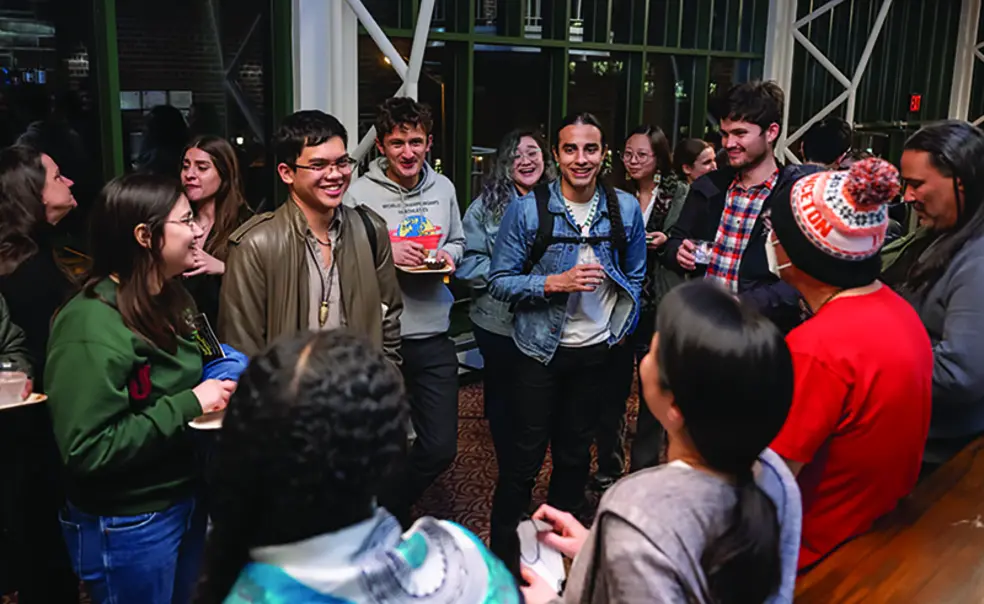New ‘Conversation Council’ Fosters Joint Projects with McCarter Theatre
More than 25 new pilots and partnerships have launched since the council was formed
Though McCarter Theatre Center in Princeton suspended live performances for 18 months during the height of the pandemic, staff were still hard at work behind the scenes, in part cementing a newly invigorated partnership with the University.
The result was the formation of a “conversation council,” with more than 70 invitees from across McCarter, the University, and the town of Princeton, that meets a few times per year to propose and explore planned joint projects. McCarter calls it “campus coupling, on stage and off,” with the University community.
“The arts are meant to bring us together as a community, and this council is a really shining example of that,” said W. Rochelle Calhoun, vice president for campus life at Princeton and McCarter’s board chair.
“It’s really about all the collaboration that we can do together to amplify scholarship [and] to be a place of arts and ideas,” said Debbie Bisno, who has been at McCarter since 2016 but took on a new role as director of university and artistic partnerships around the same time the council formed in May 2022.
For decades, the University and McCarter had what Bisno called a “wonderful marriage,” but, despite the many collaborations, “there wasn’t a highly intentional focus” to those joint projects.
Sarah Rasmussen, McCarter’s artistic director, said the long-term planning has led to more meaningful results. “Artists need time to incubate things and develop ideas, and we need time to build the capacity for that,” she said. “I know so many of our artists are really drawn to a place where they can come and perform and share their work, and also engage more deeply in conversations with scholars, with students, with community.”
According to McCarter, more than 25 new pilots and partnerships have launched since the council was formed.
For example: In February, McCarter, student co-chairs of Natives at Princeton, and the Office of the Dean of Undergraduate Students (ODUS) co-curated a conversation and social around a performance of Between Two Knees, a comedy about the Native American experience in the United States.
“There was magic that happened in seeing students connect with artists and mingle with patrons outside the campus bubble,” said Bisno, who also noted that part of McCarter’s purpose is to “remind students of what’s accessible and available.”
“I think anyone who’s participated in one of those collaborations has really found it incredibly meaningful,” said Jill Dolan, dean of the college and a McCarter board member for the past eight years.
In addition to ticketed events, the rejuvenated partnership has led to other changes, such as expanded access to McCarter for Princeton students. Students can attend up to six shows — with no restrictions as in previous years — for free.
McCarter staff have also been leading workshops that teach theater skills to members of the University community to help enhance business pitches, storytelling, and public speaking. Students and staff from the Princeton Startup Immersion Program, Princeton Entrepreneurship Council, Princeton University Press, and other groups have already taken part.
For the first time, McCarter also featured a show presented by the Lewis Center for the Arts as part of its mainstage season with the original production Felon: An American Washi Tale. Before the first of the three Felon shows, about 15 Ph.D. students chatted informally with McCarter staff about careers in the arts. Between bites of pizza and salad and sips of wine, McCarter staff spoke about their career paths, skills that are transferable from a Ph.D. program to a career in the arts, and the challenges that come along with that line of work.
The conversation was part of the Working in the Creative Arts and Public Humanities cohort, which launched in September and is supported by McCarter and the GradFUTURES team in the Office of the Dean of the Graduate School.
Arts institutions are “ideal places to have deeper conversations and do so in a really entertaining way that can bring so many different kinds of people together,” said Rasmussen. “It’s just so wonderful to see what’s possible.”










No responses yet